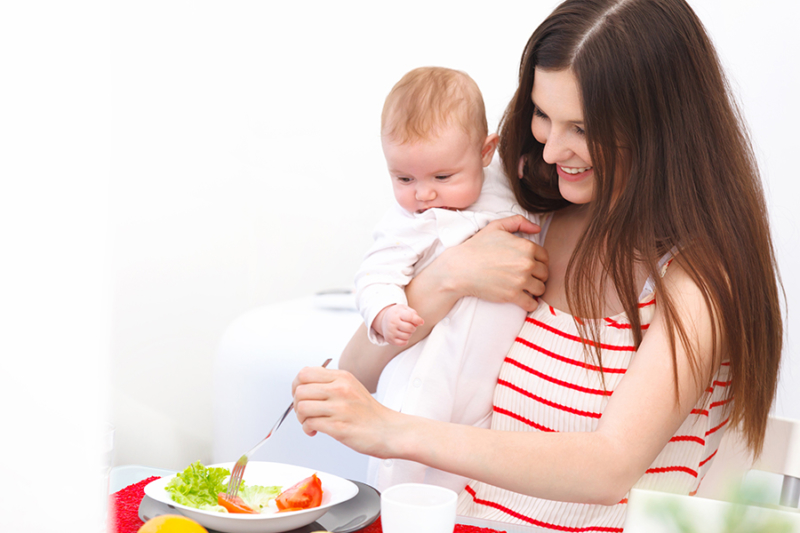We all know that breastfeeding is the best option for a healthy baby, but what about ensuring the breastfeeding mother remains healthy too? Most new mums are so busy attending to their baby’s needs they forget the importance of their own diet to make sure they can maintain their energy and health.
There is also plenty of confusion over whether new mums really need to eat for two. We explain how much more breastfeeding mothers really need to eat and which foods to focus on to stay as healthy as possible.
It is recommended that breastfeeding women eat a range of healthy food, with these guidelines:
- 5 – 7 servings from the bread, cereals, rice, pasta, noodles group.
An example of one serve is 2 slices bread; 1 medium bread roll; 1 cup of cooked rice, pasta or noodles; or 1 1/3 cups of breakfast cereal flakes.There is an allowance of about 20 g a day for poly or monounsaturated fats and oils that can be used to spread on breads or rolls or used elsewhere in the diet.
- 7 servings from the vegetables, legumes group.
An example of one serve is 75 grams or 1/2 cup cooked vegetables; 1/2 cup cooked dried beans, peas, lentils or canned beans; 1 cup of salad vegetables; or 1 small potato.
- 5 servings of fruit.
An example of one serve is 1 medium apple; 2 small pieces (150 g) of fruit (apricots, kiwi fruit, plums); 1 cup of diced fruit pieces or canned fruit; 1/2 cup of fruit juice; or 1 1/2 tablespoons of sultanas.
- 2 servings from the milk, yoghurt, cheese group.
An example of one serve is 250 ml of milk; 250 ml of soy milk; 40 grams (2 slices) of cheese or 200 g (1 small carton) of yoghurt.
- 2 servings from the meat, fish, poultry, eggs, nuts and legumes group.
An example of one serve is 65-100 grams cooked meat or chicken; 2 small chops; 2 slices of roast meat; 1/2 cup of cooked dried beans; 80-120 grams of fish fillet; 1/3 cup peanuts (almonds); or 2 small eggs.
Breastfeeding mothers also need to look after their hydration health and should drink an additional 700 ml/day (at least) of water over and above their non-lactating requirements to replace the fluid lost through breastfeeding. This equals to a total of 9 cups of fluids daily, and can be in the form of water, milk, juice and other drinks (avoid alcohol and limit caffeine-containing fluids, such as coffee, tea and cola). However, pure water should be everyone’s main drink.
Food breastfeeding mums should avoid
Some foods that breastfeeding mothers eat or drink can affect the baby, including:
- Alcohol
- Caffeine
- Spicy and other possible irritating foods
Alcohol
For women who are breastfeeding, not drinking is the safest option. The level of alcohol in breast milk is almost the same as a mother’s blood alcohol level. It appears that an occasional drink of alcohol is not harmful. However, it is advised to have minimal amounts of alcohol when breastfeeding a baby, especially in the first three months. Ways to limit the baby’s exposure to alcohol also include choosing low alcohol drinks, eating before and while drinking, and avoiding breastfeeding for two to three hours after drinking, or choosing to have an alcoholic drink immediately after breastfeeding.
Drinking alcohol in large amounts or very often can be dangerous for the baby. An intoxicated mother should not breastfeed. High intakes of alcohol may affect the mother’s ability to look after her baby and increases her risk of developing depression. Large quantities of alcohol have also been seen to displace good nutrition.
Caffeine
Some breastfeeding mothers report that their baby is unsettled, irritable, or even constipated if they drink large volumes of coffee, strong tea, or cola. However, there appears to be individual variation in how much caffeine is found in breast milk after having a high caffeine drink.
Poor milk supply may sometimes be related to caffeine intake. Caffeine can also affect the nutrient make up of breast milk. The iron levels in the breast milk of a woman who drinks more than three cups of coffee a day during pregnancy and the early phases of breastfeeding, are one-third less than that of a mother who does not drink coffee.
It is advised that during breastfeeding, caffeine consumption should be limited to 2 to 4 cups of coffee, tea or cola per day. Also, it has been found that cigarette smoking compounds the effects of caffeine in breastfed babies.
Spicy foods
While many infant specialists doubt that spicy foods cause any problems, plenty of mothers lay the blame for their baby’s unsettled behaviour on spicy or irritating foods. Some breastfed babies may get upset or unsettled if their mothers eat a lot of rich or spicy foods, or particular fruits or vegetables. If you become suspicious that a food you eat is affecting the baby, stop eating it for a few days. If the baby settles down, try the food again to see how it affects the baby. It may be helpful to avoid that food if the baby becomes unsettled again. It is advisable to speak with a dietitian or nutritionist for further advice if you find you need to avoid many different foods to keep baby happy.
Nutrients for breastfeeding women
The Australian Healthy Eating Guidelines for breastfeeding women say the nutrients new mothers need to ensure they eat include:
- Protein
- Folate
- Iodine
- Zinc
- Vitamin A
- Vitamin B6
Protein
A breastfeeding mother needs additional dietary protein to build the protein in her breast milk. Protein is vital for the growth, maintenance and repair of cells. The average requirement for protein during breastfeeding is 54 g/day but because of individual variation, some mothers will need 67 g/day or more. Protein is found in a wide range of foods such as meat (including fish and poultry), eggs, dairy, legumes (such as beans, pulses and soy products) and nuts. Smaller amounts of protein are found in grain-based foods such as bread and pasta.
Folate
Folate is a B vitamin that is needed for healthy growth and development. On average, breastfeeding mothers require 450 µg/day of folate but some will need as much as 500 µg/day or more. Folate can be found in leafy vegetables, wholegrains, peas, nuts, avocado and yeast extract (eg promite, vegemite, marmite etc).
Iodine
Iodine is an essential mineral needed for the production of thyroid hormone, and to ensure healthy growth and development. Breastfeeding mothers require on average 190µg/day of iodine, some women may need up to 270µg/day. Iodine can be found in seafood, milk and vegetables.
Zinc
Zinc is a component of various enzymes that help maintain structural integrity of proteins and help regulate gene expression. Breastfeeding mothers require on average 10 mg/day of zinc but some will need 12 mg/day or more. Zinc can be found in lean meat, wholegrain cereals, milk, seafood, legumes and nuts.
Vitamin A
Vitamin A is vital for normal growth and helps provide resistance to infections. Breastfeeding mothers require on average 800 µg/day of Vitamin A but because of individual variability some will need 1,100 µg/day or more. Vitamin A can be found in milk, cheese, eggs, fatty fish, yellow-orange vegetables and fruits such as carrots, pumpkin, mango, apricots, and other vegetables such as spinach and broccoli.
Vitamin B6
Vitamin B6 is important for the metabolism of protein and the formation of red blood cells. Breastfeeding mothers require on average 1.7mg/day of Vitamin B6 but some will need 2 mg/day or more. Vitamin B6 can be found in muscle and organ meat, poultry, fish, wholegrains, brussel sprouts, green peas and beans. Read more about the B group of vitamins .
Energy needs for breastfeeding mothers
The energy needs of a breastfeeding mother are increased because of milk production. In fact, the energy requirements for breastfeeding mothers are, on average, 2,000 kJ (445 kCal) per day more than that of a usual adult woman’s daily energy needs. These energy requirements are based on full breastfeeding in the first 6 months and partial breastfeeding after that time.
While it is normal (and expected) that mothers put on weight while pregnant, it is not recommended that mothers follow a weight loss diet after childbirth. Breastfeeding naturally allows for gradual weight loss. If you gain weight after birth, it is most likely that you are eating too much food, or choosing foods that are high in energy (kilojoules).
- At rest, exclusively sedentary or lying, for example in bed or a chair all day – 8,800 kJ/day
- Exclusively sedentary activity with little or no strenuous leisure activity such as an office employee- 10,000 – 10,550 kJ/day
- Sedentary activity with some requirement for occasional walking or standing, but no strenuous leisure activity – 11,100 – 11,700 kJ/day
- A lifestyle that involves predominantly standing or walking – 12,300 – 12,850 kJ/day
- Heavy physical work or a highly active leisure – 13,400 – 14,500+ kJ/day
Other healthy eating tips
Here are some healthy eating tips for maintaining a healthy weight:
Eat breakfast and don’t skip meals
- eat a wide variety of foods each day
- keep ‘extra’ foods, such as biscuits, cakes, chocolate and chips to a minimum
Reduce the amount of fat you eat
- limit saturated fat – saturated fats are usually solid at room temperature and are the main fats in milk, cream, butter, cheese and some meats
- choose reduced fat dairy products
- limit the amount of ‘take away’ food
- select lean meat and remove visible fat before cooking
- choose low fat cooking methods, for example – stir fry, grill, microwave, non stick cooking pans
Eat more low kilojoule foods such as wholegrains, fruits and vegetables
- 2 serves of fruit and 5 serves of vegetables each day
- Drink more water – instead of soft drink and fruit juice
- limit your alcohol intake if you choose to drink
Read food labels – especially for fat, sugar and energy (kilojoule/calorie) levels
Eat smaller portions, eat slowly, don’t fill your plate, try a smaller plate, don’t feel that you need to finish every meal.







Leave A Comment
You must be logged in to post a comment.